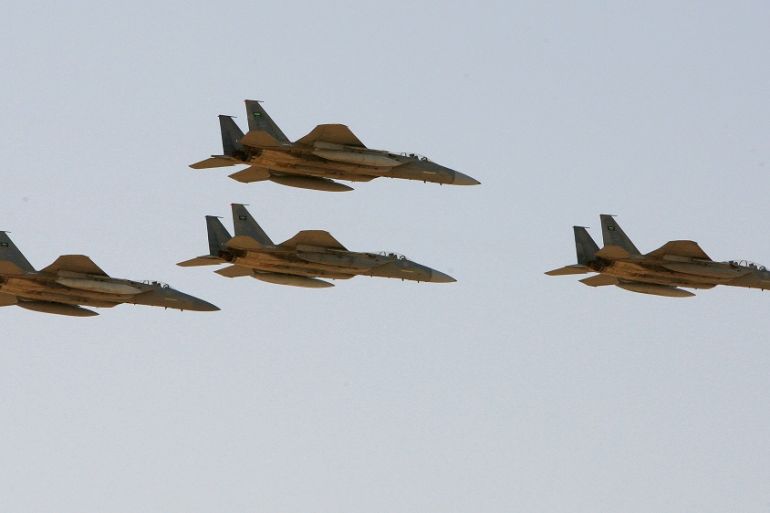US Senate narrowly approves $500m Saudi weapons sale
Critical lawmaker highlights ‘humanitarian nightmare’ in Yemen war as reason not to transfer $500m in bombs to Riyadh.

Washington DC – The US Senate on Tuesday narrowly averted a bid by a bipartisan group of senators to block President Donald Trump’s $500m sale of guided, air-to-ground bombs for use in Yemen by Saudi Arabia’s Royal Air Force.
The vote was 53-47 to defeat a resolution of disapproval that had been offered by Senator Rand Paul, a Kentucky Republican, and Senator Chris Murphy, a Connecticut Democrat. Senate Republicans were joined by five Democrats to defeat the measure. Four Republicans joined most Democrats to vote against the arms sale.
Keep reading
list of 4 itemsArmenia and Azerbaijan agree on ‘historic’ return of villages
US policy is leading to a wider war: Jeffrey Sachs on Middle East tensions
Has Israel attacked Iran’s Isfahan province? What we know so far
“We are fuelling an arms race in the Middle East,” Senator Paul said in remarks during Senate debate, citing the famine and Cholera outbreak in Yemen and Saudi domestic rights abuses as reasons not to support Trump’s munitions sale.
“What is happening today in Yemen is a humanitarian crisis,” Senator Murphy said in floor remarks. “The United States supports the Saudi-led bombing campaign that has had the effect of causing a humanitarian nightmare to play out in that country.”
READ MORE: Questions raised over $110bn arms deal to Saudi Arabia
At issue are JDAMs, or Joint Direct Attack Munitions, which are guidance systems to be used with 230kg bombs and bunker busters on Saudi F-15 fighter jets.
President Barack Obama withheld sale of the guidance systems in 2016 out of concern the Saudis were deliberately attacking civilians and critical infrastructure in Yemen, already one of the world’s poorest nations before the war.
|
|
Speaking for majority Republicans, Senator Lindsey Graham of South Carolina blamed military threats posed by Iran.
“The Iranian theocracy is the most destabilising force in the Mideast,” Graham said. “They have aggressively pursued military action through proxies and directly been involved in military action in Syria. Iran’s efforts to dominate Iraq, Lebanon, Syria and now Yemen have to be pushed back.”
More than 4,125 civilians have been killed and more than 7,200 civilians have been wounded in Yemen since the Saudi-led air campaign started in March 2015, according to a recent report by Human Rights Watch. Most of those casualties resulted from Saudi coalition air strikes.
Tuesday’s Senate vote was close enough and the outcome sufficiently uncertain that Vice President Mike Pence was briefly called to the chamber to break a tie had there been one, a rare occurrence. Republicans hold a 52-48 advantage in the Senate.
READ MORE: Amnesty queries $1.3bn US bombs deal with Saudi Arabia
Though largely symbolic, the close vote signals a potential shift in congressional willingness to support Saudi Arabia’s ongoing campaign in Yemen. By comparison, a similar resolution last year attempting to block tank sales by Obama failed by a 71-27 margin.
The disputed sale of guided missiles is a small part of a major, $110bn package of arms – including M1 tanks, Chinook and Black Hawk helicopters – arranged by Trump on his May 20 visit to Riyadh. There’s been no real move in Congress to challenge that larger transfer, begun under Obama following the Iran-United Nations nuclear deal.
Under the Arms Control Act of 1976, Congress requires presidents to notify it of any pending arms sale, and in the case of sales to the Middle East to certify that any shipments would not adversely affect Israel’s qualitative military advantage over its regional neighbours. Congress can block any arms sale simply by passing a resolution of disapproval.
|
|